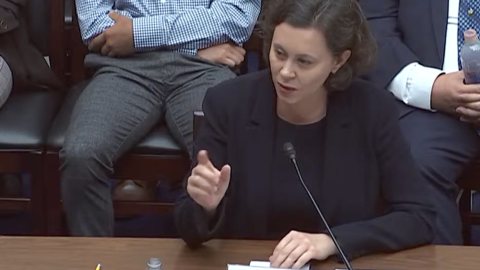Mary Kissel testifies before the Committee on Oversight and Accountability.
Written Testimony
Chairman Comer, Ranking Member Raskin, Distinguished Members:
I am honored to testify today on the Chinese Communist Party’s influence operations and their impact on the Department of State. As former senior advisor to the Secretary, I was one of the few officials who worked across all bureaus and with many of our missions abroad. I saw firsthand China’s vast influence operations and why they are a threat to our national security.
Xi Jinping has accelerated China’s influence operations via expansion and empowerment of the United Front Work Department and other party-state apparatus. Often, these operations seem like innocuous and even friendly exchanges. Sister city agreements, business chamber meetings, think tank conferences, and “interviews” with Chinese propaganda outlets, to name a few examples, are all opportunities for grey zone influence operations. Many of these activities are legal under current U.S. law.
The Chinese party-state targets our diplomats most obviously by attempting to soften their views of its totalitarian regime through formal state-to-state engagement, giving the impression of productive work. Unfortunately, talking to Party officials isn’t the same as talking to our democratic allies. Beijing uses these dialogues to give itself breathing room to further China’s foreign policy priorities and to distract us from the regime’s economic coercion, gross human rights violations against the Chinese people, the People’s Liberation Army’s accelerating militarization, and many other transgressions. This is why our diplomats must always prioritize tracking what China does, rather than what its officials say.
Xi Jinping’s regime regularly conducts influence operations within our borders, because we, as a democratic society, allow Party officials freedom of movement and speech that no ordinary Chinese citizen enjoys at home. In contrast, our diplomats must apply for advance permission to travel or meet with Chinese citizens – permission that is regularly refused without explanation or recourse – and are closely surveilled and even harassed while doing normal diplomatic work. Additionally, Beijing maintains an unofficial presence in our country, often cloaked as civil society organizations or community-based associations that ultimately report to and receive money from the Party and in some cases, instructions from China’s Ministry of Public Security. We worked to correct these imbalances during the Trump administration using the tools available to the Department, such as shuttering China’s Houston consulate for its malign activities and reinvigorating long-standing but long-ignored restrictions on Chinese diplomats’ travel. Yet we are far from achieving parity in the treatment of our diplomats.
More perniciously, China has proved adept at using State’s bureaucratic structure to its advantage. Our diplomats are incentivized to smooth disputes and reticent to issue frank statements that may upset their diplomatic counterparts. Different bureaus also pursue different priorities. As a result, State may provide conflicting messaging to Americans. For example, the Department recently encouraged American students to study in China, but at the same time, counsels Americans to “reconsider travel” to the country because of “the risk of wrongful detentions.”
Educating Americans on grey zone Chinese influence operations is also deeply important for our business community. I serve as a director of two publicly traded companies. Few American executives and directors are aware that they, like our diplomats, are prime targets of Chinese influence operations, which aim to identify prominent Americans who may now, or in the future, be convinced to aid Beijing in some form or fashion.
The State Department should be at the forefront of America’s efforts to combat Chinese Communist Party influence operations. Our political officers can work with allies to document and curb China’s malign activities. The Consular Affairs bureau can issue clear and complete travel warnings, while using new technologies to ensure visa applicants from China are thoroughly vetted for links to China’s military, intelligence, or security services. Our public diplomacy teams can proactively refute Party propaganda while promoting our superior, free political system. The International Organization Affairs bureau can track and expose Chinese influence operations at the United Nations and other multilateral bodies that receive substantial U.S. financial contributions.
Here at home, the Department can educate and inform subnational units of our federal system that are heavily targeted by influence operations but lack foreign policy expertise. The Economic and Business Affairs bureau can issue regular guidance on the risks of operating in China and the benefits of diversifying supply chains. These are just a few ways that State should be engaging in this fight. These efforts do not require new resources, but rather a more strategic allocation of our existing assets.
In conclusion, I believe this Committee’s work is vital to the national interests of the United States. I am grateful for your attention and look forward to your questions. Thank you.

















